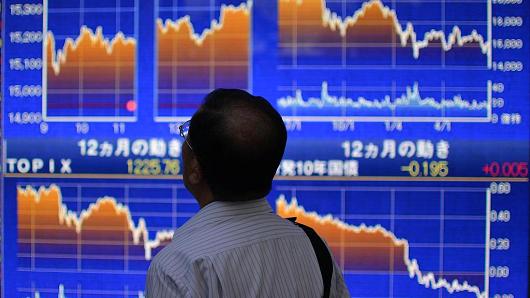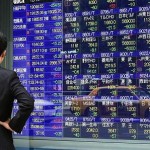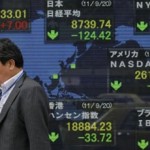Dollar Extends Drop as Japan Leads Stocks Lower; Metals Rise

-
Odds of Fed rate increase this year remain below 50%
-
South Korean won climbs to October high; yen rebounds
The dollar extended losses after the Federal Reserve reiterated its gradual approach to raising interest rates, despite acknowledging risks to the economy had abated. Japanese shares led most Asian stocks lower amid a comeback in the yen, while base metals rose.
The greenback weakened against almost all of its major peers, losing 0.6 percent to the yen as bets on a U.S. rate hike in 2016 remained below 50 percent after the Fed’s July review. Most stocks in Asia fell as Japanese equities swung back to losses and Chinese shares extended Wednesday’s slump. Equity index futures in Europe slipped and the pound dropped. Nickel led base metals higher as Australian and New Zealand government bonds rallied.

While admitting risks to the U.S. economy had subsided, the Fed left interest rates unchanged on Wednesday as policy makers take stock in the wake of the U.K.’s vote to leave the European Union. Chair Janet Yellen has repeatedly stated that the Fed is likely to raise borrowing costs gradually, though market volatility and an unexpected dip in job gains have delayed such plans. In Japan, traders are looking ahead to Friday’s monetary policy review, after Prime Minister Shinzo Abe announced a fiscal-stimulus package exceeding 28 trillion yen ($267 billion) on Wednesday in a bid to jump-start the economy.
“The Fed detailed that they see near-term risks diminished, but read between the lines and they still see medium- and long-term risks,” said Chris Weston, chief market strategist at IG Ltd. in Melbourne. Japan has “the fiscal spending package out of the way and that seems to be in line with the sort of upper end of expectations, but we don’t see it being a huge catalyst for markets to move materially higher.”
Currencies
The Bloomberg Dollar Spot Index, a gauge of the greenback against 10 major peers, lost 0.3 percent as of 7:07 a.m. in London, after slipping 0.4 percent over the previous two sessions. South Korea’s won rose to a nine-month high, leading the charge along with Malaysia’s ringgit and the New Zealand dollar.
“We’re seeing broad dollar weakness,” said Yuji Kameoka, the chief foreign exchange strategist at Daiwa Securities Co. in Tokyo. “Even though the Fed did note some improvements in the economy, a rate hike in September still isn’t certain.”
The yen pared back most of Wednesday’s 0.7 percent decline to trade at 104.81 per dollar. A majority of economists polled by Bloomberg predict Bank of Japan Governor Haruhiko Kuroda will boost asset purchases on Friday and lower the already negative key rate.
The pound slipped 0.4 percent to $1.3173 as swaps trading indicates the Bank of England is certain to cut its key rate on Aug. 4.
Stocks
About twice as many shares fell as rose on the MSCI Asia Pacific Index, which was little changed. Futures on the Euro Stoxx 50 Index slipped 0.1 after the region’s shares rose a third day on Wednesday. Japan’s Topix index declined 1.1 percent, wiping out last session’s rebound.
The Shanghai Composite Index declined 0.3 percent after posting the biggest drop in six weeks on Wednesday. Hong Kong’s Hang Seng Index lost 0.3 percent.
In Australia, the S&P/ASX 200 Index was led up 0.3 percent by gains in mining and consumer shares, while the Kospi index in Seoul slipped 0.2 percent.
Futures on the S&P 500 Index — which closed down 0.1 percent on Wednesday — added 0.2 percent, while those on the Nasdaq 100 Index were little changed even after Facebook Inc. jumped more than 5 percent in extended trading. The social-network provider reported second-quarter revenue and user growth that exceeded analysts estimates after markets in the U.S. closed.
Commodities
Nickel rose 1.3 percent in London, while copper in New York rebounded 1.1 percent from the lowest close in more than two weeks. A weakening dollar lends support to commodities priced in the greenback.
West Texas Intermediate crude added 0.2 percent to $41.99 a barrel, after sinking almost 7 percent over the past five sessions and reaching its lowest settlement price since April 19. Brent oil gained 0.1 percent after also retreating on Wednesday.
Crude inventories climbed by 1.67 million barrels last week as production increased, the Energy Information Administration reported, after analysts surveyed by Bloomberg had forecast a 2 million-barrel decline. Gasoline stockpiles also expanded amid the U.S. summer driving season, which is set to end Sept. 5 on Labor Day.
“There is still a surplus and the oil price is going to have difficulty sustaining any rally because of that,” David Lennox, an analyst at Fat Prophets in Sydney, said by phone. “We’re now heading toward the end of the drive season and the market is probably going to weaken further. The $40 a barrel level looks like the base at the moment.”
Gold for immediate delivery rose 0.1 percent to $1,340.95 an ounce after gaining 1.9 percent over the previous two sessions.
Bonds
Australian bonds led a rebound in government debt, with yields on notes due in a decade declining for the first time this week, down eight basis points, or 0.08 percentage point, to 1.87 percent. In New Zealand, similar maturity bond yields slipped four basis points to 2.22 percent.s pulled back a little, with yields up one basis point to 1.51 percent, following last session’s six basis-point slide.Rates on Rates on
Rates on Japanese notes climbed by two basis points to minus 0.275 percent. Ten-year U.S. Treasuries were little changed following last session’s six basis-point slide.
Source: Bloomberg
Related Posts
 Oil Retreats Below $47 Before OPEC Meeting as Metals Snap Rally
Oil Retreats Below $47 Before OPEC Meeting as Metals Snap Rally Emerging Stocks Slip With Oil as Dollar Rises Before Fed Minutes
Emerging Stocks Slip With Oil as Dollar Rises Before Fed Minutes Asia Stocks Fall as Oil Rebounds Before Output Talks; Lira Sinks
Asia Stocks Fall as Oil Rebounds Before Output Talks; Lira Sinks Asia Stocks Rise Most in Three Weeks as Oil Hits $50, Bonds Drop
Asia Stocks Rise Most in Three Weeks as Oil Hits $50, Bonds Drop Asian Stocks Climb With Oil Near $50 as Fed Bets Weigh on Bonds
Asian Stocks Climb With Oil Near $50 as Fed Bets Weigh on Bonds
























